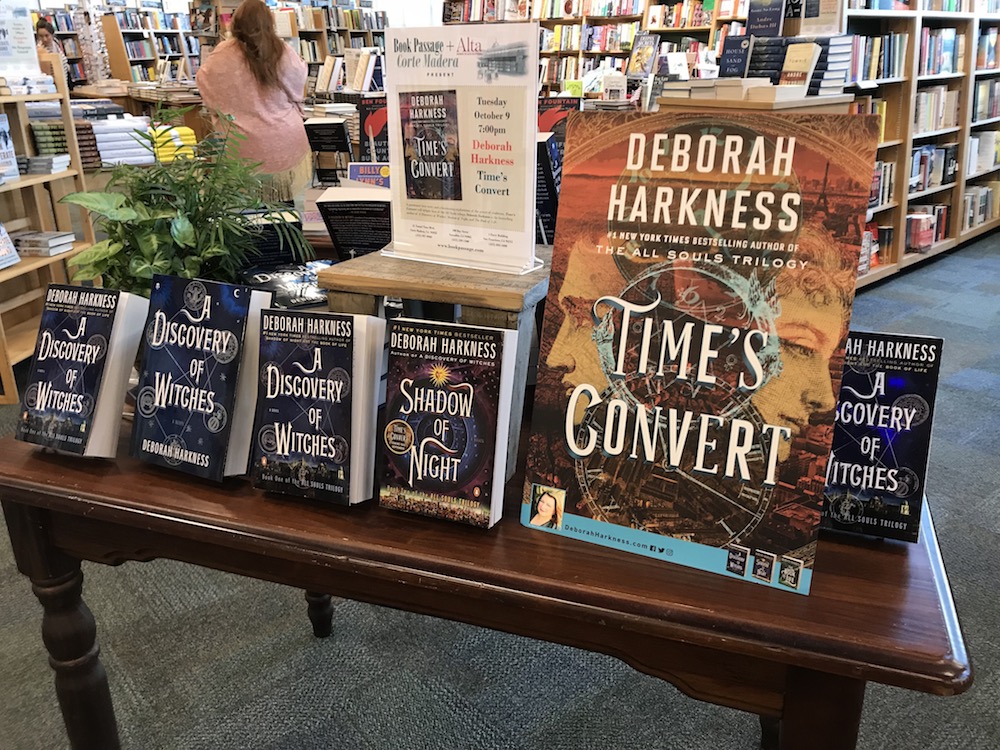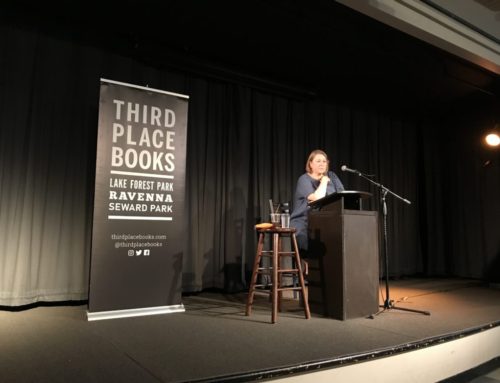It had been a little while since Deborah made it to the San Francisco Bay Area for a book tour—last time it was in 2014. This time, we got lucky since Book Passage in Corte Madera, just North of San Francisco, invited her for a book signing. To make the day even more exciting, friends from the All Souls Podcast, Chamomile & Clove, the All Souls Discussion Group, and All Souls Con joined the celebration of Time’s Convert. And a celebration it was! The event marked the 2nd week in the New York Times Best Seller List. At about 7pm, Deborah arrived and immediately started to tell us how Time’s Convert came about, the extensive historical research that went into the development of Time’s Convert, her writing process, and even about the books she read about “vampire development.”
SPOILER ALERT: If you plan to attend an upcoming Time’s Convert book signing, we recommend that you skip the transcript below. Deborah’s behind-the-scenes tale is truly a treat and is probably way better to get it directly from her. However, if you cannot make a book signing, we hope you’ll enjoy the abridge transcript.
The Time’s Convert Tale Straight from the Author
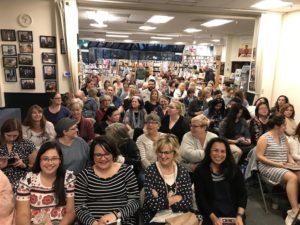 In my world as an academic, every seven years you get a sabbatical, so you don’t go mad and you can stay friendly with your colleagues. It really felt to me, I don’t know, maybe it’s some kind of internal rhythm or being a professor, it was like, “Oh my gosh. It’s seven years. It’s time for a break.” During that break, I really had to think about something quite seriously, and that was about what I was going to do next. That’s because you all were so very kind during The Book of Life tour, and all you kept you saying to me was: “We just want more.” I thought that was lovely of you to say, but I also felt like I didn’t want to just give you more. I wanted to give you the same kind of book that allowed you to sink your teeth into and feel that sort of delicious sense of immersion that you have with the trilogy, but that was also not just like a carbon copy, cookie cutter variation.
In my world as an academic, every seven years you get a sabbatical, so you don’t go mad and you can stay friendly with your colleagues. It really felt to me, I don’t know, maybe it’s some kind of internal rhythm or being a professor, it was like, “Oh my gosh. It’s seven years. It’s time for a break.” During that break, I really had to think about something quite seriously, and that was about what I was going to do next. That’s because you all were so very kind during The Book of Life tour, and all you kept you saying to me was: “We just want more.” I thought that was lovely of you to say, but I also felt like I didn’t want to just give you more. I wanted to give you the same kind of book that allowed you to sink your teeth into and feel that sort of delicious sense of immersion that you have with the trilogy, but that was also not just like a carbon copy, cookie cutter variation.
So, basically, the first thing I had to decide was whether or not I wanted to go back into the world of the Bishops and de Clermonts, and all of their friends, neighbors, four-legged friends, et cetera. That was pretty easy, because it was just around that time that I started working on a television project, and so I was surrounded by Bishops and de Clermonts 24/7 all the time. I thought, “Okay, well, I can clearly … I still have something I would like to say.”
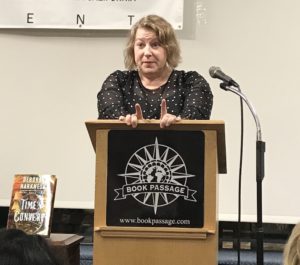 So then the big question became how do I say it? Not just the if, but the how. It took me a little while to figure out the how. I really did think deeply about whether I wanted to just roll into more stories about the Bishops and de Clermonts, and so I gave myself some time after I got off tour to just sort of freely think about any possible story I wanted to tell. I ended up with about seven or eight different stories, three of which were about the Bishop-de Clermont family, and the other five had nothing to do with them whatsoever. I went away for a couple of weeks, and I just started writing. I had, literally, piles of books, eight piles of books, bunches of notepads, and I would just write, and didn’t matter what I was writing. I kind of just played around.
So then the big question became how do I say it? Not just the if, but the how. It took me a little while to figure out the how. I really did think deeply about whether I wanted to just roll into more stories about the Bishops and de Clermonts, and so I gave myself some time after I got off tour to just sort of freely think about any possible story I wanted to tell. I ended up with about seven or eight different stories, three of which were about the Bishop-de Clermont family, and the other five had nothing to do with them whatsoever. I went away for a couple of weeks, and I just started writing. I had, literally, piles of books, eight piles of books, bunches of notepads, and I would just write, and didn’t matter what I was writing. I kind of just played around.
What came to me pretty soon was that the leading contenders for sort of the next book were probably going to be either a story about Matthew in the 16th century under the reigns of Henry the VIII, Mary Tudor, and the beginning of Elizabeth, or a book about Marcus. They were neck and neck for a long time, and then Matthew sort of pulled ahead. I wrote about 175 pages of a book that I had titled Serpent’s Mirror, and then Matthew did something unexpected, which I should’ve expected because I’d lived with Matthew for a while now, and he always does that. But it basically brought me to a screeching halt, because I just needed a little bit more time to work that through.
So at that point, I turned to the project about Marcus and started really dedicating myself to that. That’s when sort of what has become my process kicked in. When I first started writing these books, everybody wanted to talk to me about my process, and I just kept saying, “I don’t have one.” That was mostly because I had no idea what I was doing. I am a trained historian. I am not a trained writer. What the means is is that I automatically assume that everything I’m doing is A, crazy, B, not a good idea, and C, weird. This is basically how it’s been for the last four novels now, so I guess I do have a process, now that I’ve written four novels.
What I started doing once I decided I was going to really focus on Marcus was I had began to keep a series of notebooks, long-hand notebooks. I get up every morning I possibly can [inaudible] characters. It made finishing the trilogy very, very hard, because I just kept wanting to chuck more characters. My editor said, “You cannot do this anymore. There are enough characters in this book. It’s time to resolve things, not introduce new plot lines.” But that’s what I love. So I thought, perfect. First of all, we’re going to follow Matthew and Diana, but we’re also going to focus a little bit on Phoebe Taylor.
Phoebe Taylor, for those of you who might not remember, was the young woman who worked at Sotheby’s, the art historian, who was horrified that Matthew had a Holbein painting hung over the downstairs toilet, and who fell in love with Marcus Whitmore. What we knew from The Book of Life was that she and Marcus had decided not only to get married, but that they wanted a traditional wedding, so she going to become a vampire.
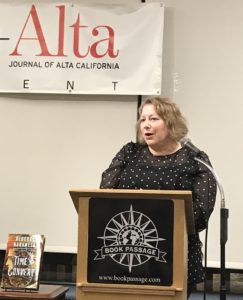 So we follow Phoebe over her first 90 days as an infant vampire, from the moment she is reborn a vampire up through the end of the summer, so again, we go from May to August, and over her first 90 days. We’re doing that in part because I started thinking, “Well, the twins are entering their terrible twos. What are the terrible twos like for a vampire? What’s puberty like for a vampire? What happens when you turn 21 when you’re a vampire? What’s middle age like as a vampire?” I started to think about this. I had a newspaper interviewer say to me, “Which vampire books did you read to find out all that development?” I replied, “I read What to Expect When You’re Expecting.” What I did was I read human development books, books about pregnancy, books about child rearing, books about childhood, books about adolescence, menopause, middle age, getting married, the whole thing, and I thought to myself, “Okay. If vampires do everything more quickly than humans, then basically what would happen if a vampire’s development … sort of what normally happens in human’s lifespan takes place over a year, but in a vampire it takes place in a day?” So that Phoebe goes from basically infancy to old age over the 90 days of the summer, and every day brings a new set of challenges as she is sort of speedily being reborn into this preternatural creature.
So we follow Phoebe over her first 90 days as an infant vampire, from the moment she is reborn a vampire up through the end of the summer, so again, we go from May to August, and over her first 90 days. We’re doing that in part because I started thinking, “Well, the twins are entering their terrible twos. What are the terrible twos like for a vampire? What’s puberty like for a vampire? What happens when you turn 21 when you’re a vampire? What’s middle age like as a vampire?” I started to think about this. I had a newspaper interviewer say to me, “Which vampire books did you read to find out all that development?” I replied, “I read What to Expect When You’re Expecting.” What I did was I read human development books, books about pregnancy, books about child rearing, books about childhood, books about adolescence, menopause, middle age, getting married, the whole thing, and I thought to myself, “Okay. If vampires do everything more quickly than humans, then basically what would happen if a vampire’s development … sort of what normally happens in human’s lifespan takes place over a year, but in a vampire it takes place in a day?” So that Phoebe goes from basically infancy to old age over the 90 days of the summer, and every day brings a new set of challenges as she is sort of speedily being reborn into this preternatural creature.
It also enabled me to bring into the story someone who I desperately wanted to get into The Book of Life and was not able to do so, and that is Freya, one of Matthew’s scary half-sisters. It hurt deeply when I had to cut her out of all the final chapters of The Book of Life, because there were, frankly, too many characters in it already, but I saved all of that stuff, and it’s right into the beginning of Time’s Convert.
So, we’ve got the story of Diana and Matthew, and their children. We’ve got the story of Phoebe going from infancy through her first 90 days. One of the things that I decided was because they were so intent on a traditional relationship, that the family pulled out all the old rules and regulations on how to make a vampire, some of which had to do with the fact that when you make a vampire, they should be secluded from society, she was gonna be with her maker’s family, she was kept away from Marcus to be sure that when she became reborn as a vampire she still wanted to be with him.
This gave me my third strand of the story, which is the historian strand. I think you guys are all stuck with a lot of history as we move forward into other books in this series. For me, though, I did not want to go back to time-walking. I think it’s really implausible to think that a young mother with two 18 month olds would be like, “Okay, well, I’ve done my research, and I’ve cleaned up the kitchen, and the kids are in bed, and I’m going to time-walk for the next two hours. I’ll be back soon.” Too risky, and it’s too difficult. So instead, with Phoebe away in Paris undergoing her transformation, and Marcus with Matthew and Diana and the children in France, the events of Phoebe’s transformation, the news Marcus is getting from Paris all brings back his own experiences, both before and after he became a vampire in the 18th century. So Marcus is given an opportunity to remember and reflect what it was like to be catapulted out of the frontier of Massachusetts on the edge of the American Revolution, and into one of the biggest, baddest, patriarchal families known, which was the de Clermonts. That could not, I thought, in my little doodling in my notebook, had been an easy adjustment for him to make, and so I really got to delve into the 18th century, and be a kind of student of history again.
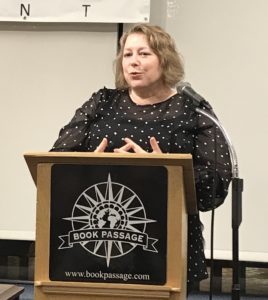 I know y’all think, and it’s terribly flattering, that historians know everything there is to know about the past, but I know an awful lot about a very limited time frame, and what that means is that even if I sometimes in my survey teach the 18th century and the French Revolution, the Enlightenment, it’s not where I live. It’s not where I have a real feeling for the period, so I essentially spent the 18 months of my research and development bothering everybody I knew, American or French Revolutionary historian, reading lists that they gave their own graduate students for their exams, studying, reading primary sources, reading primary sources in French, 18th century French is no joke, and then trying to get a real flavor for the period so that I could put it in the books, and give you that same kind of rich reconstruction of the world.
I know y’all think, and it’s terribly flattering, that historians know everything there is to know about the past, but I know an awful lot about a very limited time frame, and what that means is that even if I sometimes in my survey teach the 18th century and the French Revolution, the Enlightenment, it’s not where I live. It’s not where I have a real feeling for the period, so I essentially spent the 18 months of my research and development bothering everybody I knew, American or French Revolutionary historian, reading lists that they gave their own graduate students for their exams, studying, reading primary sources, reading primary sources in French, 18th century French is no joke, and then trying to get a real flavor for the period so that I could put it in the books, and give you that same kind of rich reconstruction of the world.
Now, there were some bumps along the way, because it turns out that while Diana, as a modern person, might be catapulted back into Elizabethan England and give you a glorious 12 page description of a dress, it seems unlikely to me that a 17-year-old boy in Massachusetts would go into the same detail over things like home furnishings. I think I was in the middle of a description where Marcus was talking about a woman he met in a store, and I thought, “There’s no way any 17-year-old boy would be cataloging the flounces and ribbons on this dress.” So some of you might find that historical reconstruction a little bit weird, because remember, it’s not through a modern perspective, and it’s not through a female perspective. I was trying to capture, based on my research, what it seemed to me like a boy of his age and background would be noticing and observing, and that was really a fun challenge for me as a historian.
So I want to give you a little bit of a taste of what I mean by all this, and again, I told you we weren’t going to have lots of spoilers. This is actually from chapter nine, but it’s a passage that if you’ve read the series, you already know about, because what you know is that Marcus met an ancestor of Sarah Bishop at the Battle of Bunker Hill. And that that woman taught him how to set a leg. So I’m going to read you a little bit about that to give you a sense of what I mean by kind of reconstructing this male perspective on war.
This is before Marcus becomes a vampire, when he is just an ordinary, warm-blooded human thrust into the middle of this war.
Deborah reads Chapter 9.
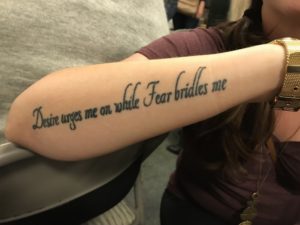 So, it turns out that I can give you more. That’s a good thing, but I also, just to go back to my first reaction when you were all so kind back in 2014 and ’15, I don’t ever want to give you just more. I always want to give you a story that somehow exercises your mind and your imagination, and makes you passionate about history, and makes you curious about things. Some of you may have picked up the books because it said it was tale of forbidden love between a vampire and a witch. Fair enough. That’s what it said on the back jacket. For those of you who have read it, it’s also a story about the power of empathy, and the importance of change, and how being different can save the world, and how we have to find some better way to accept and embrace the differences among us if we’re going to survive.
So, it turns out that I can give you more. That’s a good thing, but I also, just to go back to my first reaction when you were all so kind back in 2014 and ’15, I don’t ever want to give you just more. I always want to give you a story that somehow exercises your mind and your imagination, and makes you passionate about history, and makes you curious about things. Some of you may have picked up the books because it said it was tale of forbidden love between a vampire and a witch. Fair enough. That’s what it said on the back jacket. For those of you who have read it, it’s also a story about the power of empathy, and the importance of change, and how being different can save the world, and how we have to find some better way to accept and embrace the differences among us if we’re going to survive.
That was the sort of deeper message of the trilogy, and for Time’s Convert, really, the deeper message was all about family. It was all about parents and children, and the ordinary extraordinary dramas that make us all heroes, and make every act that we do something epic for everyone in this room who was a child, or has a child, or cares for someone else’s child in a hospital, in a school, in a library, in a bookstore, wherever it is. You know, that’s really what we’re doing that’s important. Sometimes we get a little bit consumed with big stakes and epic stories, and the real message for Time’s Convert is every single day requires more courage for most of us than is required from any superhero in any Hollywood motion picture.
I hope that you guys enjoy your deep dive back into the 18th century, and your re-connection with Bishops and the de Clermonts. Thanks again to Book Passage, thanks to all of you for coming, and we’ve got time for Q&A, so we’re going to be able to do that before the signing. So thanks again, and get ready, because I’m a professor, and I will not allow spoilers.
Q&A with the Fans
Fan: Do you have in you a story about Hugh? A love story about Hugh?
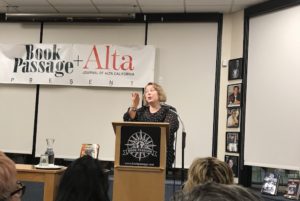 Deborah: So the question is do I have a love story about Hugh? I certainly have a lot of stories about Hugh, and a lot of them are quite passionate, and there are a lot of them are also very much tangled up with the family of the de Clermonts, and with the things that Philippe most wanted the de Clermont family to achieve, namely the safety of Ysabeau at any cost and all cost. So, it’s not just a happily ever after love story with Hugh and Fernando, but it is a story I very much want to tell, and hope to tell in the future, once I figure out how to tell it. And that’s always, you know, that’s going to always be that key for these. But yeah, I would love to delve into that story and find out why Fernando was so very sad, and why he and Philippe had such a very difficult relationship. So thanks for the question.
Deborah: So the question is do I have a love story about Hugh? I certainly have a lot of stories about Hugh, and a lot of them are quite passionate, and there are a lot of them are also very much tangled up with the family of the de Clermonts, and with the things that Philippe most wanted the de Clermont family to achieve, namely the safety of Ysabeau at any cost and all cost. So, it’s not just a happily ever after love story with Hugh and Fernando, but it is a story I very much want to tell, and hope to tell in the future, once I figure out how to tell it. And that’s always, you know, that’s going to always be that key for these. But yeah, I would love to delve into that story and find out why Fernando was so very sad, and why he and Philippe had such a very difficult relationship. So thanks for the question.
Fan: My family’s been in Hadley since the 1870s, and I was wondering if it was a nostalgic choice for you to choose Hadley, because of where you went to school, or if there was actual historical significance for choosing that town over say North Hampton or Hatfield?
Deborah: So my family’s been in Hadley since 1638. We’re probably related. But yeah. So I picked it, because as I was writing the story about fathers and sons, my own father was dying of cancer, and so I wanted to kind of … One of the things my father and I used to do is family history and genealogy, so we’ve been over every inch of Hadley with cameras and grave rubbing things, and so it’s not an accident that the MacNeils come from Pelham, which is a town my father’s family settled and then married into a bunch of people from Hadley.
It was actually not as much to do with Mount Holyoke as it was my own weird family tree. But it just meant that it was a wonderful opportunity for me to kind of weave my dad into the story. Thanks for the question.
Fan: I’ve now heard, Marte, Marthe, and Marta. How do I pronounce her name?
Deborah: Any of those will work. It’s sort of like Dee-ana, Diana, Diane, you know, or Alyssea, Alysha. There is no one right way to say it, and actually, at every single turn, everybody asked me, and I always say, so Jennifer Ikeda said to me, and I said, “Well, how would you say it?” She said, “Marta, or Mart.” And I said, “Fine. Do it however you’re comfortable with.”
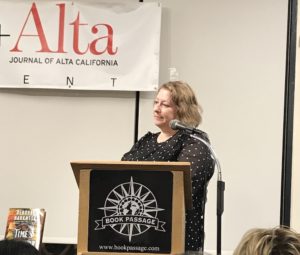 I then went onto the set and the first thing Lindsay Duncan said to me, the one who’s playing Ysabeau, is “How am I supposed to say her name?” “However you want to say it.” She said, “I want to say it Marth.” I said, “Perfect. That works, too.” So actually if you talk to 18 French people, they would have probably about seven different pronunciations for this. So you can do it anyway you want. There is no wrong answer. There is a wrong answer for Ysabeau, though. Ysabeau you really do say Ysabeau, even if you want to say it with an inflection on the first of the last syllable, it doesn’t matter, but it’s not … I’ve heard some amazing interpretations of the name, and it is just Ysabeau, or Isabeau if you really want to be very French about it.
I then went onto the set and the first thing Lindsay Duncan said to me, the one who’s playing Ysabeau, is “How am I supposed to say her name?” “However you want to say it.” She said, “I want to say it Marth.” I said, “Perfect. That works, too.” So actually if you talk to 18 French people, they would have probably about seven different pronunciations for this. So you can do it anyway you want. There is no wrong answer. There is a wrong answer for Ysabeau, though. Ysabeau you really do say Ysabeau, even if you want to say it with an inflection on the first of the last syllable, it doesn’t matter, but it’s not … I’ve heard some amazing interpretations of the name, and it is just Ysabeau, or Isabeau if you really want to be very French about it.
Good question. Happy to relive everybody’s mind. That’s a common question.
Fan: In all of the characters that you’ve written, who’s been the most annoying or most ill-behaved?
Deborah: Matthew is always the most annoying, and … well, actually, yeah, probably most annoying and the most ill-behaved. So the question was who was the most annoying and ill-behaved. The list always starts with Matthew, but the most challenging, but also the one that I like writing most is, Philippe.
Because he’s my favorite. So, for me, if you think about the All Souls world as a solar system, Philippe is the sun around which everybody else revolves, and I need to know where Philippe is alive or dead no matter whose story I’m telling, because he’s always pulling the strings to get back to our first question. The players who are left on our board, are still playing the game that he setup very, very long time ago, so I have to know. So that makes him, I wouldn’t say annoying, but deeply, deeply challenging. Because uncovering all those little threads is something of an adventure. But yeah, great question.
Fan: This is a … I’m trying not to be a spoiler here, but I live in the UK. And have seen the first few episodes of A Discovery Of Witches.
Deborah: It’s okay. We all know what happens.
Fan: The only problem I … I love all of the casting, except there’s one that I’m concerned about now having read Time’s Convert, and that is Marcus, because he seems to me incredibly British, without the American twist.
Deborah: But he is. At this point.
Fan: I know, but even, just … I don’t know, because I like him. I really like him as an actor, and I liked the way he played him, but I always, in my head, I guess I heard him being much more Americanized, not necessarily American born-
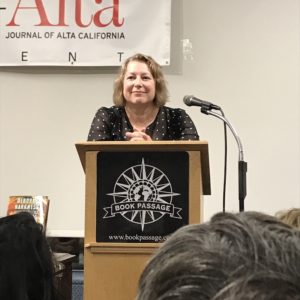 Deborah: Me, too, and then I had this really long conversation with Jennifer Ikeda, in which she explained that all of her linguistic research seemed to suggest that he would’ve spoken with a British accent in the 18th century, and I then went to the linguistic department, and I said, “Okay, this is going to make me nuts.” And they said, “She’s right.”
Deborah: Me, too, and then I had this really long conversation with Jennifer Ikeda, in which she explained that all of her linguistic research seemed to suggest that he would’ve spoken with a British accent in the 18th century, and I then went to the linguistic department, and I said, “Okay, this is going to make me nuts.” And they said, “She’s right.”
Fan: But he’s not there now. I mean, that’s the thing.
Deborah: But he is in Britain now.
Fan: Yeah, but he has been Americanized for quite some time.
Deborah: Yeah, but he … You’re just going to have to let that go. I know it is really hard. It’s really hard. He is literally … when they said to me, “We want you to look at this tape-“… and I said, “Okay.” And they said, “He has dark hair, and he’s British.” I said, “Oh my god. It’s Marcus. No one may touch his hair.” Because he was just like … [gestures pinching Edward Bluemel’s cheeks], and so no, I think we’re all just going to have to like Edward.
Fan: Can I just say on Matthew front?
Deborah: Yeah?
Fan: So much better than I even expected.
Deborah: You can have whoever team you want, [inaudible]. He’s still pretty hot when you get [inaudible]. But here’s the thing. You guys have all sort of been like for literally the last, all [inaudible] these many years, been like, I will not watch that show, because that is not my Matthew. My favorites are the ones who said, “I will not watch this show. Ysabeau has black hair.” I’m like, “In no point in any of the books does Ysabeau have dark hair.” Everybody imagines and creates their own vision for all these characters.
And the other thing is like really we only have human beings to capture these characters. We have to do the best we can, and I constantly, I’m really happy with the casting.
I think they are really superb. So for all of you who have only seen the trailers or whatever, it’s really the show. Give it the benefit of the doubt. Remember it’s an adaptation. Remember sort of like the great Mart, Martha, Marta comment, that there’s kind of no right way to do any of this, because it is an interpretation, just like you could go see a Shakespeare play and everybody’s wearing flower costumes. Did Shakespeare ever imagine that? Hell no..
Fan: But people, don’t worry. It’s marvelous.
Deborah: Thanks.
Fan: And Matthew is sex on legs.
Deborah: And he’s also a lovely man, and very, very smart, and just a real pleasure, so you’re all in for treats. I swear. I promise on my life. But thank you. But yeah, let it roll.
Fan: Well, I have a question I asked in Philly, and I’m like … I have a more important question now. The question Philly was the cuss words that Matthew would use. I’m still waiting on that one.
Deborah: We will get them.
Fan: Okay, good.
Deborah: The problem is that UCLA did not go back in session until the last week of September, which is when I was on tour, and nobody in the French department really wanted to answer my email.
Fan: Okay, what language? So it’s French then?
Deborah: Well, no. It’s Occitan. So I got a whole list from a professor of medieval French literature who specializes in Occitan curses. So yeah-
Fan: Philippe is one of the very first vampires, because we never … we don’t know his age?
Deborah: No, we don’t know his age.
Fan: No.
Deborah: He’s very, very old.
Fan: So now is he one of the first? Because in the first novel we talk about the first witches, but we never talk about the first vampires or first demons in that book, so I’m like … Philippe makes me feel like he is one of the first.
Deborah: He’s very, very old. [inaudible] have to see where that leads us.
Fan: Do you ever find it hard to balance between your actually academic life at school maybe doing academic writing and then also balancing that with your All Souls writing?
Deborah: Oh yeah. Yeah, so the question’s about my illusion of balance, which is an illusion. It’s not impossible, but it’s hard, and I tend to get through it by compartmentalizing. So I have the time when I’m writing, and then I have the time when I’m exercising my analytical brain, and teaching students to exercise their analytical brain, and then I have to go back to the happy land where I get to make things up as opposed to have to reason them out. So it works for me, but it’s not easy, and the gear changing if I’m tired can be extremely painful for everyone. So literally I just get and I’ll be like, “Okay, wait a minute. Give me a second. All right, I’m good now.” Because I can almost feel me having to flip switches, so yeah. It’s a little harder than it looks.
Fan: So I’m going to try to phrase this carefully … but having viewed the de Clermont family in the past and in the present, I’m just kind of curious how Philippe thinks things are going.
Deborah: Wow. What a good question. I think Philippe feels like things are going in unexpected directions, but everything is working out just fine.
Fan: Sounds like my tarot cards.
Deborah: I have the oracle. I foresee the future. But I think that there are certain things that he’s quite concerned about that he did not get to fully address and resolve, and so there are still some pretty big … I think a laugh and a laugh, we will get back to bigger life and death stakes at some point after a whole lot of train track has been laid down where we get to understand Hugh, and Fernando, and all these other people, because that’s all going to have to be sort of mobilized to resolve the things that Philippe didn’t quite get finished. I mean, the thing is about Philippe is he was a deeply flawed man. He’s absolutely devoted to Ysabeau, would do anything and throw anyone under the bus to protect Ysabeau. But he had enough self-knowledge to know that, and so he also knew when he had made mistakes and when he didn’t quite get something done like he needed to. So, that’s the sort of where his anxiety his compounded.
Fan: I apologize beforehand if you’ve already dealt with this in the previous books. My memory is … But how have you dealt with Diana’s mortality versus immortality?
Deborah: Well, she’s mortal, and a warm-blood, and not going to have an extended life.
And Matthew has an extended life, and I think, again, the sad truth is none of us really live forever, and we all have to make the best of what we get handed. So I think that’s a really normal part of life. One of the things we need to do better maybe in our time is learning to say goodbye, and learning how to live without the kind of regrets where we wake-up and think “Oh my god what did I do the last 20 years of my life?”
Fan: Okay. I’m just wondering if Diana’s absorption of the Book of Life might have effected something.
Deborah: Nope, nope.
Fan: I’m just curious if the cast reached out to you for feedback on how their character’s reacting? Are they reading the books? I mean, you’ve spoken about how happy you are with the casting. Are they conferring with you on how their character would react?
Deborah: What I do, and this is a question about my relationship with the cast, I’m an executive producer. So I’ve been with the show since our first creative discussions all the way through to the last final edits this summer. I made it clear to everybody in every department and to all the cast that I was available to them if they wanted to talk. Then I just left it to them. So I’ve had conversations with a lot of the cast, not everybody, but a lot of the cast about their characters. Mostly they come to me with questions, so it’s kind of cool, because they’re subject is like Miriam, so Aiysha came to me. “I want to know this about Miriam. I want to know that about Miriam.” And they were the best questions about … or Edward who came, who plays Marcus and just like … and then I would start playing around with them. So I said, “Okay, Edward, do you think Marcus is a kind of love ’em and leave ’em guy, or is he kind of like goes from one serious …” And he stood there for like two minutes, and he’s like, “I think he falls really hard, and then he goes from girl to girl, but he kind of has these regrets when he leaves.” And we went through [inaudible]. I’m like, “Oh my god, that’s perfect. That’s exactly what I was thinking.”
So it was a real trip to see how these very talented actors and actresses came to terms with these very complicated characters very, very fast, because that’s their job, right? Is to look at what are these characters and figure it out. And wonderful, wonderful conversations with Owen Teale about Peter Knox, and how to get Peter Knox on the screen and this really-
I mean, what Owen was really concerned about was not making him a cardboard villain, but understanding what motivated Knox, and so those are the moments that I’ll remember for the rest of my life when I’m there sitting with the person who’s going to bring this character to life, having this incredibly complicated, thorough discussion of like, yeah, but how does Peter Knox feel when this happens? That’s just a total trip and a real privilege, so again, I think you’ll be really pleased with the results, and how these actors have really taken on and embraced these characters that you guys all love and that I love, and now that they love, too.
All right, so it’s time to sign books.

